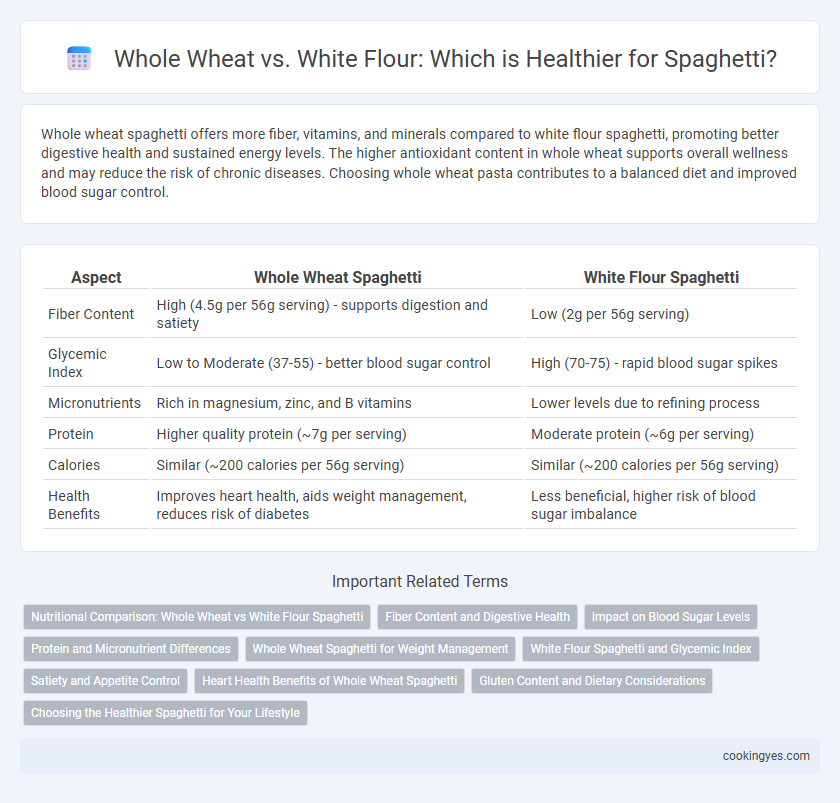Whole wheat spaghetti offers more fiber, vitamins, and minerals compared to white flour spaghetti, promoting better digestive health and sustained energy levels. The higher antioxidant content in whole wheat supports overall wellness and may reduce the risk of chronic diseases. Choosing whole wheat pasta contributes to a balanced diet and improved blood sugar control.
Table of Comparison
| Aspect | Whole Wheat Spaghetti | White Flour Spaghetti |
|---|---|---|
| Fiber Content | High (4.5g per 56g serving) - supports digestion and satiety | Low (2g per 56g serving) |
| Glycemic Index | Low to Moderate (37-55) - better blood sugar control | High (70-75) - rapid blood sugar spikes |
| Micronutrients | Rich in magnesium, zinc, and B vitamins | Lower levels due to refining process |
| Protein | Higher quality protein (~7g per serving) | Moderate protein (~6g per serving) |
| Calories | Similar (~200 calories per 56g serving) | Similar (~200 calories per 56g serving) |
| Health Benefits | Improves heart health, aids weight management, reduces risk of diabetes | Less beneficial, higher risk of blood sugar imbalance |
Nutritional Comparison: Whole Wheat vs White Flour Spaghetti
Whole wheat spaghetti contains higher fiber content, essential for digestive health, compared to white flour spaghetti, which is lower in dietary fiber due to refining processes. Whole wheat also provides more vitamins and minerals, such as magnesium, zinc, and B vitamins, enhancing its nutritional profile over white flour. The lower glycemic index of whole wheat spaghetti supports better blood sugar regulation, making it a healthier choice for sustained energy and metabolic health.
Fiber Content and Digestive Health
Whole wheat spaghetti contains significantly higher dietary fiber compared to white flour spaghetti, promoting better digestive health and regular bowel movements. The rich fiber content in whole wheat supports gut microbiota by providing prebiotics, which enhance nutrient absorption and reduce constipation risks. In contrast, white flour spaghetti lacks substantial fiber, often leading to quicker blood sugar spikes and less support for long-term digestive wellness.
Impact on Blood Sugar Levels
Whole wheat spaghetti contains more fiber and complex carbohydrates, which slow digestion and reduce blood sugar spikes compared to white flour spaghetti. The higher fiber content in whole wheat helps improve insulin sensitivity and provides more sustained energy release. White flour spaghetti, with its refined starches, causes more rapid increases in blood glucose levels, potentially impacting blood sugar control negatively.
Protein and Micronutrient Differences
Whole wheat spaghetti contains higher protein levels and greater amounts of essential micronutrients such as iron, magnesium, and B vitamins compared to white flour spaghetti. The bran and germ in whole wheat preserve fiber and antioxidants, contributing to improved digestion and cardiovascular health. White flour spaghetti has fewer nutrients due to refining, which removes these beneficial components despite its lighter texture.
Whole Wheat Spaghetti for Weight Management
Whole wheat spaghetti contains higher fiber content than white flour pasta, promoting satiety and aiding in weight management by reducing overall calorie intake. The complex carbohydrates in whole wheat help regulate blood sugar levels, preventing spikes and crashes that can lead to overeating. Rich in essential nutrients such as magnesium and B vitamins, whole wheat spaghetti supports metabolic health while providing a lower glycemic index compared to white flour alternatives.
White Flour Spaghetti and Glycemic Index
White flour spaghetti has a higher glycemic index (GI) compared to whole wheat spaghetti, causing quicker spikes in blood sugar levels after consumption. This rapid increase in glucose can contribute to insulin resistance and elevated risk of type 2 diabetes when consumed frequently. Choosing whole wheat spaghetti with its lower GI helps promote better blood sugar control and sustained energy release.
Satiety and Appetite Control
Whole wheat spaghetti provides higher dietary fiber content compared to white flour, promoting greater satiety and aiding appetite control by slowing digestion and stabilizing blood sugar levels. The complex carbohydrates and essential nutrients in whole wheat help reduce hunger cravings and prolong fullness after meals. Choosing whole wheat pasta supports weight management and overall metabolic health through enhanced appetite regulation.
Heart Health Benefits of Whole Wheat Spaghetti
Whole wheat spaghetti offers significant heart health benefits due to its higher fiber content, which helps reduce LDL cholesterol levels and improves blood vessel function. The presence of essential nutrients like magnesium and antioxidants in whole wheat supports cardiovascular health by lowering blood pressure and reducing inflammation. Choosing whole wheat over white flour spaghetti contributes to better heart disease prevention and overall cardiovascular wellness.
Gluten Content and Dietary Considerations
Whole wheat spaghetti contains more gluten than white flour pasta, which may affect those with gluten sensitivities or celiac disease. It is richer in fiber, vitamins, and minerals, promoting better digestion and blood sugar control compared to white flour spaghetti. Choosing whole wheat pasta supports dietary needs by enhancing nutrient intake while mitigating gluten-related health concerns for sensitive individuals.
Choosing the Healthier Spaghetti for Your Lifestyle
Whole wheat spaghetti contains higher fiber content and essential nutrients such as B vitamins, iron, and magnesium compared to white flour spaghetti, promoting better digestion and sustained energy levels. Choosing whole wheat spaghetti supports heart health by helping to lower cholesterol and regulate blood sugar, making it a preferable option for those managing diabetes or cardiovascular conditions. White flour spaghetti, while softer in texture, offers fewer health benefits due to its refined nature and lower nutrient density.
Whole wheat vs White flour for spaghetti health benefits Infographic

 cookingyes.com
cookingyes.com